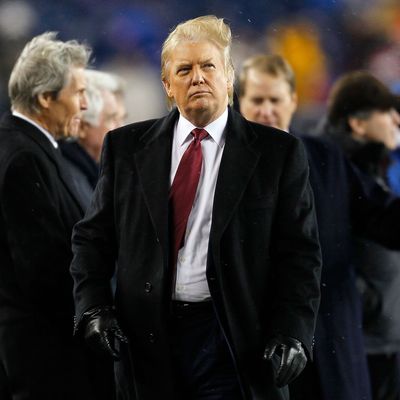
Before yesterday, Donald Trump’s campaign to demonize protesting NFL players seemed to be completely in hand. Trump had utterly cowed the league’s owners into banning protests against police brutality, and had achieved at least some success in casting the players as unpatriotic. But his tantrum against the Philadelphia Eagles places him in a highly vulnerable position, potentially turning the tide of the culture wars against him decisively.
The predicate for the conflict was the decision by a large majority of the Eagles roster to skip a planned ceremony to commemorate their Super Bowl championship. These kinds of events are part of the spine of the ceremonial head of state role performed by the president. Britain has one person (the prime minister) handling the the job of leading the government, and another group of people (the royal family) acting as symbolic heads of state. A president’s ability to project his image in the latter role enhances his dignity and allows him to escape the gravitational pull of political conflict, which is part of what gives incumbent presidents an inherent reelection advantage. If Trump is so divisive he cannot fulfill that role, it will hamper and diminish him.
The Eagles reportedly attempted to schedule the ceremony for when Trump would be in Singapore. When that failed, attendance reportedly fell to up to three players, plus the owner and the team mascot, who was presumably willing to attend because the head-to-toe costume would preserve his anonymity. If Trump was clever, he might have jiujitsued the affront. He could have praised the attendees for their willingness to “ignore politics,” and turned the boycotting players into spoilsports intent on politicizing a unifying event.
But Trump is not clever. In the face of a challenge to his authority, he is no more capable of acting strategically than an amoeba is of considering the advantages and disadvantages of moving toward a bright light. Stung by the humiliation, Trump lashed out with a wild lie that the players “disagree with their president because he insists that they proudly stand for the national anthem.” Fox News has been running footage of Eagles players kneeling in prayer — not during the anthem — as a way of visually supporting Trump’s charge. In fact, no Eagles players knelt during the anthem last season.
With his crude lie exposed, Trump issued a revealing non sequitur response:
Taken literally, this makes no sense. Trump is claiming he disinvited players for choosing to remain in the locker room during the anthem. But the NFL policy requiring protesting players to remain in the locker room does not even take effect until next season. Nobody has done it yet. What Trump is implying, instead, is that skipping an appearance with Trump is tantamount to skipping the anthem. His confusion is revealing. In his own mind, Trump is the flag, just as Trump is the law.
But picking a cultural fight with the NFL is not like picking a cultural fight with the New York Times or Rosie O’Donnell. From the standpoint of many Americans, especially white working-class men, the NFL is the quintessentially patriotic institution. Sociologists have described sports fandom as a kind of ersatz patriotism, with tribal conflict taking the place of war. I do not follow the NFL, but I do follow college football, which has a similar effect on its fans. Football fans have loyalties to a team that are equivalent to religious or patriotic affiliation. The league has invested hundreds of millions of dollars to secure this association. It has wrapped itself in every form of public virtue: not only ostentatious flag-waving, but charity (in which its players take part visibly) and racial unity (professional football provided a high profile spectacle of Americans of different colors joining together).
The Eagles roster happens to contain a number of players who take their philanthropic and social responsibilities with the utmost seriousness. Malcolm Jenkins visited Congress to lobby for criminal-justice reform; Chris Long donated his entire year’s salary to charity. These gestures are amplified by the league’s publicity machine, and players revered by their fans.
For several years, Joe McCarthy’s paranoid ravings about the communist conspiracy held Washington in a state of terror. He began to destroy himself when he turned his attacks against a fellow Republican, Dwight Eisenhower, and the Army. The Army-McCarthy hearings, during which the right-wing demagogue attempted to tear down an esteemed pillar of American life, set the stage for the disintegration of his public standing. Trump’s war with the NFL won’t destroy him, but he has placed himself on the wrong side of a cultural rift.






























